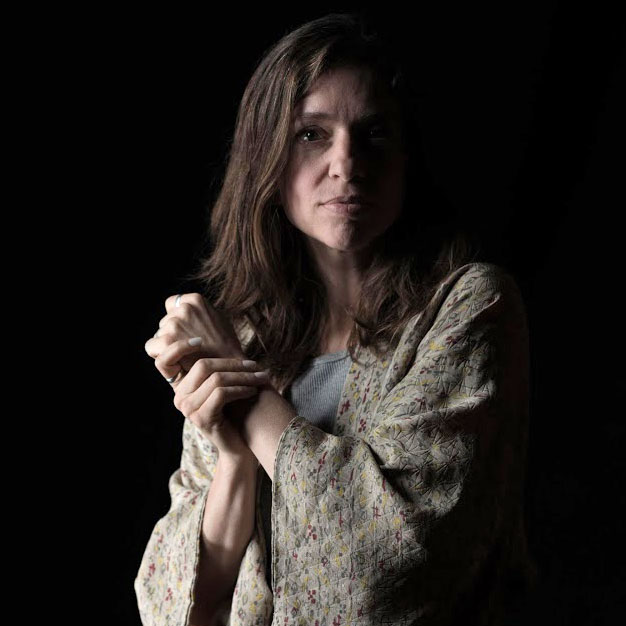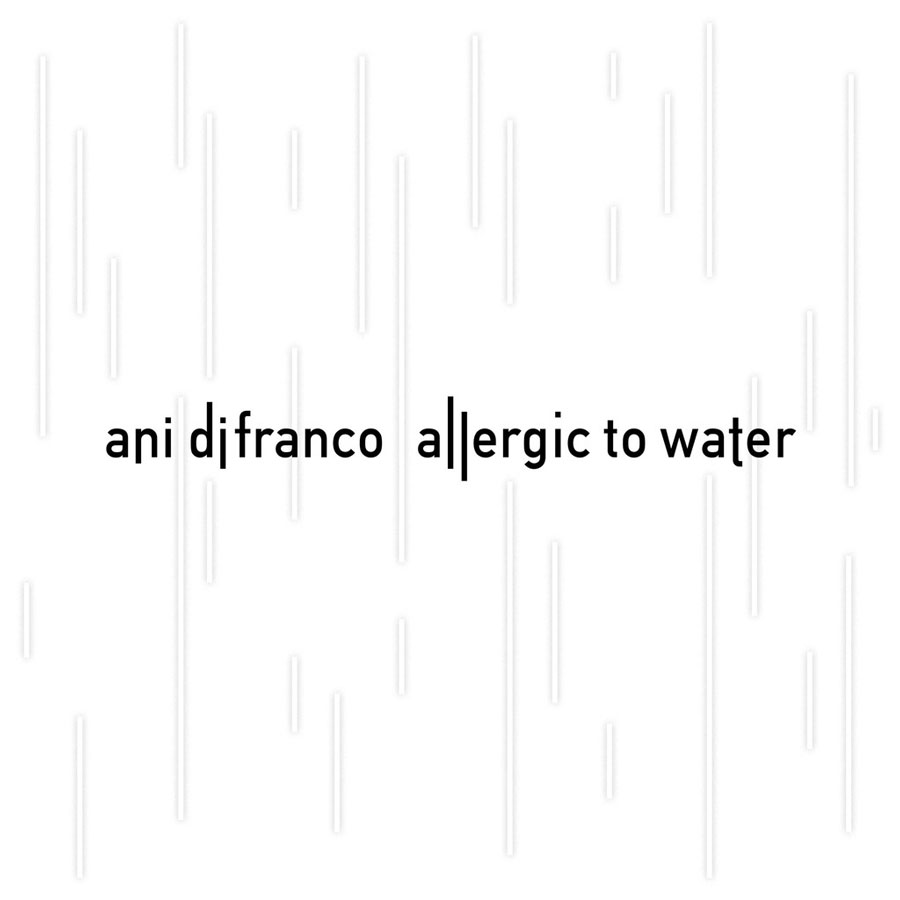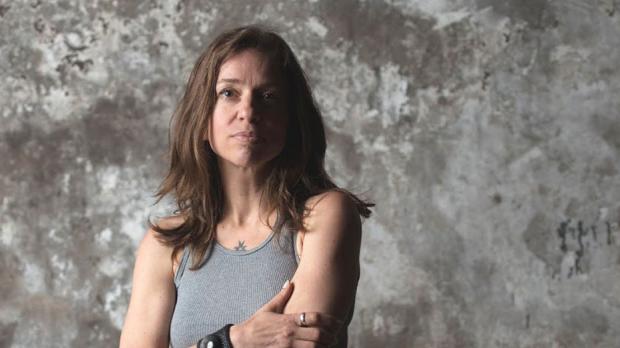Public Speaking: Ani DiFranco
Still the beaming force first heard throughout Buffalo more than 25 years ago, Ani DiFranco recently debuted her 18th album, Allergic to Water. Complemented by powerhouses like Todd Sickafoose, Terence Higgins, and a myriad of other rock-star names, the album sounds and feels like a new, yet familiar Ani—a sentiment that seemed to characterize our recent conversation with the singer-songwriter. A thinker, a poet, and one hell of a conversationalist, DiFranco returns to her home, Asbury Hall at Babeville, on Wednesday, February 4.

You are a musician, artist, activist, and icon to so many, but how would you describe your place in life right now?
In terms of my vocation I’ve always called myself a folk singer. I like, in my own mind, to keep it simple like that. My heroes and my teachers are people like Utah Phillips and Pete Seeger, and whenever I wonder what I’m supposed to be doing in life or what I’m supposed to be fulfilling, I just think about them and think, “I just shouldn’t be worried about that.” I follow their example and just keep on the path, doing the political work and spreading art and joy and not worrying about what I am or how am I perceived.
What is the relationship between your activism and your music?
To me I’ve never separated the things—the parts of myself or the ways in which my self manifests. People always ask about the relationship between politics and art, and I just think that they’re talking about the relationship between your kidney and your spleen. It’s just one organism that’s trying to fulfill some kind of higher purpose, like many of us are, and it comes out in different ways. Just being accountable, being joyful, being compassionate to fellow humans, it all can take various forms—transcending pain and helping others to transcend pain. To me it’s like whether you’re singing a song or writing a letter to your congressman, it’s just different ways of doing the same thing.
You’ve created the Righteous Babe empire for independent artists. When did you know it was time to start your own label?
Well, it wasn’t really like a defining moment. It was sort of like incremental developments. I think even wwhen I was releasing my first cassette tape, I just wrote, “Righteous Babe Records” on it. This totally homespun recording of my songs that I would sell in my gigs in bars in Buffalo. There was no glamor to it, there was no record label with an office or anything, it was just my statement to the world of “I’m just doing this on my own.” And then, at some point, it got a little hard to handle. People were writing into the address on the first tape and trying to get a hold of me, so I hired my best friend, Scot Fisher, and we’ve been working together ever since. And then after him, we hired my other friend, Susie, who I lived with at the time, so from there the label sort of grew. But really it was just like I’d turn to my best friend like, “Will you help me?” It wasn’t a landmark occasion. It was just sort of an organic development, like a mindset that I had right off the bat. People always ask me like I had some grand vision that I realized, and it’s like, “No, I stumbled here.”
In the early 1990s you sold tapes out of the trunk of your car. Now people are purchasing your songs on the internet. There have been so many changes in the music industry as a whole since your career began. What do you feel is the best way to connect with your audience?
Playing live. Music is a social act, I will say it until I’m dead. It is something that we do together. I think that’s the essential state of music: a moment that is shared. So recorded music in itself is kind of a vicarious experience to me. So how recordings do or don’t get out to the world is very secondary in my mind. I’m a performing artist, I’m a living artist, I’m somebody whose art exists more in a moment than it does on a record. In fact, when I get too mired in regrets of not making my records good enough and feeling like I’ve slaughtered too many good songs for posterity, I think, “Fuck it.” My art is alive in time and space, and I share it with people live. That’s always going to be most important for me and that’s always going to be what I do best. And hopefully I’ll leave a document behind that’s useful to somebody in terms of records. But I really don’t stress that if I can help it.

Allergic to Water seems a true testament to everything you stand for. Does this release feel different, being that it was mixed and produced on your own?
I do feel like it’s different, and there’s a little shift even between the last record and this one. It’d be hard to articulate. I just feel like I am getting better at making records, finally—fucking 20 records later. I know better than to be satisfied with a recording that’s not an appropriate performance or not the best “this” or “that,” so I just take my time now, which is something I never used to do in the past. It was always like, “Boom, there it is, okay, moving on.” But now I’m a little more aware, I guess because I take the time. I can take months in between recording a song and finishing it and releasing it—years even, these days. So I have a little more perspective. I think that on this recording, there’s sort of a more relaxed me that you can hear singing. On stage when I’m singing, I don’t worry about anything other than just being true and open and honest and trying to connect with people, whereas in a recording studio, you’re worried about all kinds of things.
It’s nice that you can be your own litmus test without having those third parties.
I’ve found that that’s best, even if it takes me time and years to figure out what sucks about myself and work on it, that’s the time it takes. Because nobody else standing up and pointing at you and saying, “This sucks,” is quite as effective, and it can be kind of debilitating. I decided long ago to not read any press about myself, because I was getting mired in it. I was instantly getting really hurt and really defensive, and then you just get more wrapped up in yourself and what people think, and that’s the last thing you need when you’re trying to make art.
I was listening to “Woe be Gone” from Allergic to Water and the lyrics “The history of the world is such a losing place, the alphabet took us on a wild goose chase” stood out most to me. What was your mindset when you wrote this?
It’s kind of cryptic, that song. That’s the way it came out and that’s the way I left it. I guess I’ve read some books in the last few years of my life that have changed my thinking radically and have really opened up doors of thinking for me. One of them is called The Alphabet Versus the Goddess, and that song is really just born right out of that book. Another book that’s interrelated in my mind is The Spell of the Sensuous. These books, they got me really thinking about language—this thing that has been a guiding light in my life: words, the written word. I’ve used words to liberate myself, to free myself, to become myself, and now later in life I’m looking at words in a different way. I’m looking at the shadow side of language thanks to the sort of ideas that were presented to me in these books. A light went off in my head and it just rang so true that language is the great liberator of mankind and it’s the great oppressor. Any great shining object, writes Leonard Shlain in The Alphabet Versus the Goddess, casts that big a shadow. And the central tenant of that particular book is that the written word is responsible for patriarchy. If you get into it and you read history through this completely alternate way of viewing it, as this book does, it just makes so much sense. The written word was basically this great invention that facilitated the left brain takeover of the world. The modern world is an invention of the left hemisphere of the human brain. We’ve remade the world really with one half of our consciousness. The other half of our consciousness, which is more emotional and more intuitive, which is artistic, which is aware, which is non-linguistic, non-storytelling, not sitting in the past and the future—living in the now—is in the right hemisphere of our brains, which is also the feminine side of our nature, and which is then subordinated. And it was the written word that was the ammunition for the subordination of half of our consciousness. And so I’m very, very compelled by this concept now and that song, I think, is just the first step in me writing about all these new ideas that are swirling in my head.
Could you describe for me the setting in which you create?
Over the years and the many circumstances I’ve learned to just sneak work in edgewise with whatever people around me, with limited time and space, with babies that demand things. But my ideal situation, of course, is to have time and to have space to be alone. These days, the place that I can write the most and the best is after a show. When I walk off stage, I’m still full of the energy of the show, I’m full of the energy of the people that I just spent an hour and a half with, I go into my dressing room, and if I’m lucky and I don’t have to get on the bus or go talk to people, I can be left alone with all of that energy and inspiration and create new things. I’ve written a bunch of songs recently, and it’s because I left my kids at home, and I went on tour, which is kind of excruciating, but then I have this opportunity and I walk off stage into my dressing room and I shut the door for hours and I play and play. It’s been this really joyful time for me to have space with my guitar after years for being really deep in the “mommy” thing.
How does it feel to return to Asbury Hall and Buffalo?
Oh it’s always nice to come back to the mothership. It’s a little bittersweet now because I finally sold my house in Buffalo, and I’m just once and for all living full-time in New Orleans with my kids. So I don’t have a homebase in Buffalo anymore and I’m becoming more and more of a visitor when I come there, and my time there is more and more rare. So yeah, you know, I miss it. I miss my friends there. I especially miss Scot, my manager and partner for so many years, for so many things. For all intents and purposes, he’s my brother. When Buffalo was my homebase still, in my downtime Scot and I just hung out together. There’s a lot of ideas we came up with when we were just gardening together, or cooking, or fixing something. So we don’t have that idle time together anymore, and it’s much harder, we both find, to reinvent what we’re doing without that time together. So that’s what I miss most: being in my garden in Buffalo with my friend Scot, trying to change the world.
If you were to write a book, what would your dedication say?
I’d probably say, “Thanks to Nappy and the Shorties,” my husband and my kids, for the unconditional love it took to make something as big as a book. It takes a lot of support from the people around you, so I imagine if I were to ever complete a series of complete sentences like that, it would be very much thanks to the efforts of my loved ones. I feel kind of like that anyway. I think everything I do now is thanks to them, because unconditional love is just this incredible fuel. My strength these days comes from my family. Mostly my partner; my fella changed my life in that way. Unconditional love was like a door opening. I feel like it’s a new beginning, it’s a new me now that can try to continue on. I remember when I first started having babies years ago, and people were saying, “Well, you’re going to lose your edge now, huh?” and “You were this edgy thing and now you’re going to be Mr. Mom,” and I thought, “Wow, that’s a weird way of looking at it.” I mean I can understand where that comes from because that happens to a lot of people, they soften when they have kids and they soften when they get older, but for me, it’s like, to lose the desperation of my youthful searching for love and be able to spend that energy elsewhere is liberating and empowering.
What’s next for you?
What is next? I’ve finally written a lot of new songs in the last couple of months because I started going on tour without any kids, which has been very rare for years. And now, having two kids, like any parent, my time on my own is very precious. I feel like I’ve learned to really use it—I’m just in songwriting boot camp when I leave the house now. So that’s got me excited. I haven’t been able to really finish songs in years because I’ve been so depleted by my fucking babies, so I get really excited by these new songs that I think are really interesting and different. And so I’m doing three tours in a row and later on in the spring I’m going to start recording them. Just keep moving on, working on a new record with new ideas.

